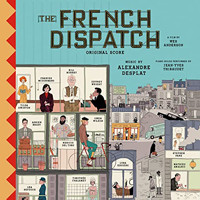- Composed by Alexandre Desplat
The latest from the brilliant Wes Anderson, The French Dispatch is set in the French office of the Liberty-Kansas Evening Sun, soon to close following the death of its editor. All the usual suspects are there, including Anderson’s regular composer Alexandre Desplat, who finds a way in these films to bring out his seldom-heard witty, quirky side. His score opens with the truly outstanding “Obituary”, which very much reminds me of Ennio Morricone’s comedy scores, taking inspiration from a classical master (in this case Bach) and throwing a whole load of “quirk” at it – there’s something so delightful about it, the little cells of phrases repeated across various soloists (from harpsichord to tuba) in an inherently comic way. It’s three and a half minutes of pure musical bliss, my favourite piece of film music of 2021; it’s so striking, I wonder if it might be enough to push the composer towards yet more awards when that season rolls around.
Aside from that standalone opening, the rest of the score is presented in sections. The first of these is made up of five pieces of piano music, played by Jean-Yves Thibaudet. There’s something cleverly dream-like about the sudden unexpected junctures in the playing – you get familiar with a tune then it just turns off the other way – I suspect it’s a neat way of conveying the kind of alternative reality in which Anderson’s films sit. Notable too is the warmth that goes through it all – it’s so lovely, “Moses Rosenthaler” in particular, but also the jazzy “The Berensen Lectures at the Clampette Collection” (great track titles throughout!) – and that piece offers a kind of transition into the second section of score cues, which are the more overtly comedic ones. “Police Cooking” is again like a 60s Italian comedy score (perhaps more Piccioni than Morricone this time) – a great little tune, all these little instrumental flourishes which rarely do anything but bring a smile to my face. This launches a sequence of no fewer than seven tracks all built around the same idea – the array of variations Desplat manages to produce to get subtly different feelings is really impressive. I have to say I think the best way of experiencing the score is to do so in sequence, but the album scatters in an array of songs and orchestral pieces – it’s all good stuff, but focusing on the Desplat is rewarding. You’ll love it or hate it – I think the whole thing is absolutely delightful, light and breezy and imbued with genuine wit – so I love it.
Rating: ****
facebook.com/moviewave | twitter.com/MovieWaveDotNet | amazon.com












Great review on this one, Southall! Glad to see you appreciate this score, especially as a complete listen. It’s short and sweet and brings a smile to my face, what more can a guy ask for?
Thanks for the great review James! Monsieur Desplat has slowly become one of my favorite composers. The collaboration Desplat – Anderson is a recipe for originality and enjoyment. I saw this film and have to see it again: what a load of details, every frame has something to admire. Minimalistic as this score is, it fits the film like a glove. I sometimes miss the old masters but someone like Desplat makes me happy again!
By the way, in the score, you can HEAR the distant voices of masters like Delerue and Morricone… how comforting! That trumpet line at the end of the first track is an example and it gives me the shivers!
PS I wanted to buy the digital download first, but bought te CD because of the BEAUTIFUL cover!!